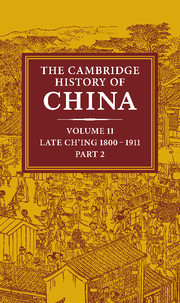Book contents
- Frontmatter
- 1 Economic trends in the late Ch'ing empire, 1870–1911
- 2 Late Ch'ing foreign relations, 1866–1905
- 3 Changing Chinese views of Western relations, 1840–95
- 4 The military challenge: the north-west and the coast
- 5 Intellectual change and the reform movement, 1890–8
- 6 Japan and the chinese revolution of 1911
- 7 Political and institutional reform 1901–11
- 8 Government, merchants and industry to 1911
- 9 The republican revolutionary movement
- 10 Currents of social change
- Bibliographical essays
- Bibliography
- Index
- Map 1. Ch’ing empire – physical features
- References
8 - Government, merchants and industry to 1911
Published online by Cambridge University Press: 28 March 2008
- Frontmatter
- 1 Economic trends in the late Ch'ing empire, 1870–1911
- 2 Late Ch'ing foreign relations, 1866–1905
- 3 Changing Chinese views of Western relations, 1840–95
- 4 The military challenge: the north-west and the coast
- 5 Intellectual change and the reform movement, 1890–8
- 6 Japan and the chinese revolution of 1911
- 7 Political and institutional reform 1901–11
- 8 Government, merchants and industry to 1911
- 9 The republican revolutionary movement
- 10 Currents of social change
- Bibliographical essays
- Bibliography
- Index
- Map 1. Ch’ing empire – physical features
- References
Summary
MERCHANTS AND MODERN ENTERPRISE: A REASSESSMENT
When the Ch'ing dynasty collapsed in 1911, there were about six hundred Chinese-owned manufacturing and mining enterprises run by machinery. Some 5,600 miles of railway track had also been laid. The amount of Chinese capital involved in these modern ventures was probably about $160,000,000. This was sizeable, but represented only 6 or 7 per cent of the capital invested in agriculture.
Although the last decade of the Ch'ing saw an accelerated pace in these developments, especially in the building of railways, these several industries did not lead to any sustained economic growth. Little planning was done among their sponsors and managers to see that industrial developments were functionally integrated among themselves and with other sectors of the economy – credit facilities, capital formation, marketing, tax structure and the like. In any case, many of the necessary changes presupposed a nation-wide basis of operation and were therefore beyond the means of the provincial officials who dominated modern industry. (Even the far larger economic spurt between 1918 and 1922 failed to establish a trend towards sustained growth. In 1933, the Chinese modern sector, consisting of manufacturing, mining, banking and transport, accounted for only about 12 per cent of the nation's net domestic product.)
The political rationale for industrialization
It was not for lack of trying that China's early industrial experiments ended with dismal results. Beginning with the building of shipyards and arsenals in the 1860s, leaders of the Chinese political and intellectual elite took a series of actions which clearly indicated their favourable attitude towards Western technology and industrial management.
Keywords
- Type
- Chapter
- Information
- The Cambridge History of China , pp. 416 - 462Publisher: Cambridge University PressPrint publication year: 1980
References
- 3
- Cited by



